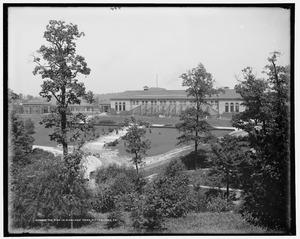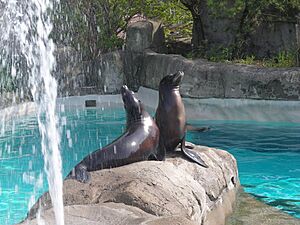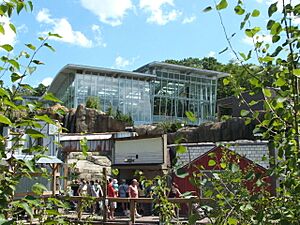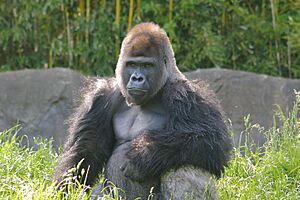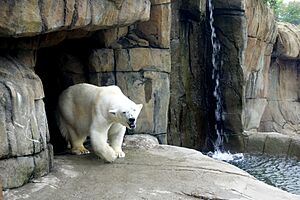- This page was last modified on 17 October 2025, at 10:18. Suggest an edit.
Pittsburgh Zoo & Aquarium facts for kids
 |
|
| Date opened | June 14, 1898 |
|---|---|
| Location | Pittsburgh, Pennsylvania, United States (in Highland Park) |
| Land area | 77 acres (31 ha) |
| Coordinates | 40°29′02″N 79°55′05″W / 40.484°N 79.918°W |
| No. of animals | Over 4,000 |
| No. of species | 475 |
| Annual visitors | 1+ million |
| Major exhibits | Forest Passage, African Savanna, Tropical Forest, The Islands, Jungle Odyssey, Aquarium, Water's Edge, Kid's Kingdom |
The Pittsburgh Zoo & Aquarium is a special place in Pittsburgh, Pennsylvania, that is both a zoo and an aquarium. It's one of only six places like it in the United States. The zoo is located in Highland Park and covers 77 acres (31 ha) of land. It is home to more than 4,000 animals from 475 different species. This includes 20 species that are threatened or endangered in the wild.
The zoo first opened way back in 1898 as the Highland Park Zoo. Over the years, it changed from a simple collection of animals into a place focused on protecting them. Starting in the late 1930s, the zoo began to grow and improve its animal homes. For a while, it was known as the Pittsburgh Zoo and PPG Aquarium, but it changed its name back in 2022.
Contents
History of the Zoo
How It All Began
The Pittsburgh Zoo opened on June 14, 1898. A man named Christopher Lyman Magee donated $125,000 to build a zoo in Highland Park. In the early days, the zoo was more like a menagerie, which is a collection of animals in cages.
Over time, the zoo's leaders realized it was important to give the animals homes that looked and felt like their natural environments. The zoo's main goal shifted to conservation, which means protecting animals and their habitats.
Big Changes and New Additions
In 1937, new, more natural homes were built for the bears. In 1949, a special Children's Zoo opened. It had fun, interactive areas for kids. One popular part was a giant fake block of cheese where real mice lived!
A large aquarium called the AquaZoo opened in 1967. At the time, it was the only aquarium in Pennsylvania and the second-largest in the country.
In the 1980s, the zoo started a big project to make all the animal homes more natural. The Asian Forest opened in 1983, followed by the African Savanna in 1987. In 1991, the Tropical Forest opened. It's a huge indoor rainforest with many types of monkeys and tropical plants.
Becoming a Modern Zoo
In 1994, the zoo became a private nonprofit organization. This means it is run by the Zoological Society of Pittsburgh, not the city. That same year, an Education Complex was built with classrooms and a library. This showed the zoo was serious about teaching people how to protect wildlife.
In 2000, the AquaZoo was completely redone and renamed the PPG Aquarium. It became twice as big as the original.
Sadly, there have been serious accidents at the zoo. In 2002, a zookeeper was fatally injured by an elephant. In 2012, a very serious accident happened at the African wild dog exhibit. For safety, the wild dogs were moved to other zoos and the exhibit was changed.
Amazing Animal Exhibits
The Pittsburgh Zoo is split into eight sections, each with its own theme.
Kid's Kingdom
Kid's Kingdom is a fun, interactive area for children that first opened in 1949. It has a petting zoo where you can get close to gentle animals. There is also a reptile house, a playground, and exhibits with local wildlife like white-tailed deer and North American beavers.
You can crawl through tunnels in the meerkat exhibit to see what it's like to be a burrowing animal. You can also walk through an area with red kangaroos. Kid's Kingdom is a great place to learn about animals up close.
Aquarium
The PPG Aquarium is a two-story building filled with amazing underwater worlds. Its theme is the "Diversity of Water." You can see exhibits that look like a tropical rainforest, a Pennsylvania river, and a colorful coral reef. There is also a popular penguin exhibit with king, macaroni, and gentoo penguins.
For many years, the aquarium was home to a famous Amazon river dolphin named Chuckles. He was the only one living in a North American aquarium for a long time. He lived to be 34 years old. A picture of him is on display to remember him.
Forest Passage
This area takes you on a journey from the Himalayas to Indonesia. It features some of the world's most endangered big cats, like Siberian tigers and Amur leopards. You can also see Komodo dragons and cute red pandas.
This section used to be called the Asian Forest. It was renamed after two Canada lynxes moved into the old snow leopard home.
Tropical Forest
Step inside this half-acre indoor rainforest that opened in 1991. It's home to 16 species of primates, including lemurs, monkeys, western lowland gorillas, and Bornean orangutans. You can also spot other rainforest animals, like the slow-moving Hoffmann's two-toed sloth.
African Savanna
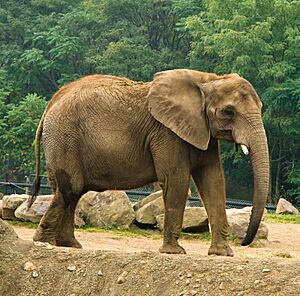
An African bush elephant at the zoo.
Completed in 1987, this exhibit makes you feel like you're walking through an African savanna. It is home to many famous African animals. You can see lions, African bush elephants, Masai giraffes, Grant's zebras, and rhinos.
This area also includes Cheetah Valley. This exhibit used to have African wild dogs, but it was changed for visitor safety. Now, you can watch speedy cheetahs from behind a glass window.
Water's Edge
Water's Edge, which opened in 2006, looks like a coastal fishing village. It shows how people and sea animals live near each other. The best part is a long underwater tunnel. You can walk through it and see polar bears, sea otters, and northern elephant seals swimming all around you.
The Islands
Opened in 2015, The Islands is a large exhibit featuring endangered animals from tropical islands. Here you can find Philippine crocodiles, Visayan warty pigs, and beautiful clouded leopards. The area is designed to feel like a tropical getaway, with sand and beach chairs.
Jungle Odyssey
This area, which opened in 2017, shows you animals from rainforests all over the world. It has a cool mixed-species exhibit with capybaras and giant anteaters living together. You can also see ocelots, fossas, and a pygmy hippopotamus.
Breeding and Conservation
The zoo plays an important role in protecting endangered animals by breeding them.
Baby Elephants
The zoo has had great success with its African bush elephants. In 1999, a female calf named Victoria was born. She was the first African elephant born at the zoo and the first to be born to a mother who was also born in a zoo. Since then, three more elephant calves have been born at the zoo, helping to increase the population of these amazing animals.
Tiger Cubs

An Amur tiger at the zoo.
The zoo has also helped the endangered Amur tiger population. In 2006, a mother tiger named Toma gave birth to three cubs. Two of them, a male named Petya and a female named Mara, grew up healthy. In 2008, another male cub named Grom was born. These births are very important for the survival of this rare tiger species.

